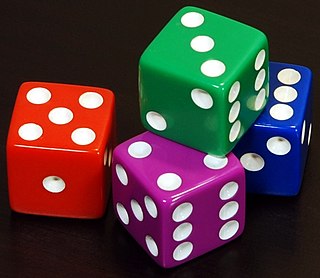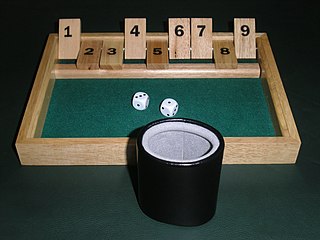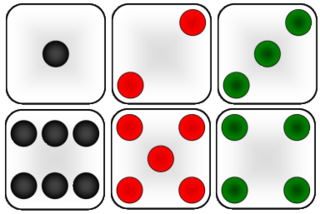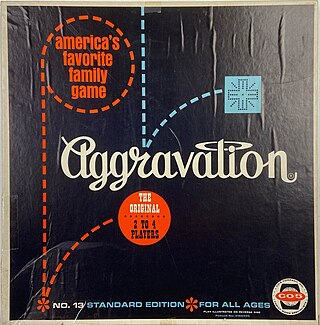
Dice are small, throwable objects with marked sides that can rest in multiple positions. They are used for generating random values, commonly as part of tabletop games, including dice games, board games, role-playing games, and games of chance.

Ludo is a strategy board game for two to four players, in which the players race their four tokens from start to finish according to the rolls of a single die. Like other cross and circle games, Ludo is derived from the Indian game Pachisi. The game and its variations are popular in many countries and under various names.

Mahjong or mah-jongg is a tile-based game that was developed in the 19th century in China and has spread throughout the world since the early 20th century. It is played by four players. The game and its regional variants are widely played throughout East and Southeast Asia and have also become popular in Western countries. The game has also been adapted into a widespread online entertainment. Similar to the Western card game rummy, mahjong is a game of skill, strategy, and luck. To distinguish it from mahjong solitaire, it is sometimes referred to as mahjong rummy.

Parcheesi is a brand-name American adaptation of the Indian cross and circle board game Pachisi, published by Selchow & Righter and Winning Moves Games USA.

Yahtzee is a dice game made by Milton Bradley. It was first marketed under the name of Yahtzee by game entrepreneur Edwin S. Lowe in 1956. The game is a development of earlier dice games such as Poker Dice, Yacht and Generala. It is also similar to Yatzy, which is popular in Scandinavia.

Shut the box is a game of dice for one or more players, commonly played in a group of two to four for stakes. Traditionally, a counting box is used with tiles numbered 1 to 9 where each can be covered with a hinged or sliding mechanism, though the game can be played with only a pair of dice, pen, and paper. Variations exist where the box has 10 or 12 tiles. In 2018 the game had a renaissance in Liverpool, England, when it became the house game at Hobo Kiosk pub on the Baltic Triangle. It was popularized by DJ duo Coffee and Turntables and became the most played board game in Merseyside for 4 years in a row.

Mia is a simple dice game with a strong emphasis on bluffing and detecting bluff related to Liar's dice.

Alternity is a science fiction role-playing game (RPG) published by TSR in 1998. Following the acquisition of TSR by Wizards of the Coast, the game was discontinued in 2000 as part of a broader rationalisation of TSR's business holdings, but it retains a small and devoted fanbase. Parts of Alternity as well as TSR's classic Star Frontiers game have been incorporated into the d20 Modern game, especially the d20 Future setting. The first campaign setting for the Alternity game, the Star*Drive setting, was introduced in 1998.

Cee-lo is a gambling game played with three six-sided dice. There is not one standard set of rules, but there are some constants that hold true to all sets of rules. The name comes from the Chinese Sì-Wŭ-Liù (四五六), meaning "four-five-six". In America it is also called "See-Low," "Four-Five-Six," "The Three Dice Game," "Roll-off!," and by several alternative spellings, as well as simply "Dice." In China it is also called "Sān Liù Bàozi" (三六豹子), or "Three-Six Leopards". In Japan, it is known as "Chinchiro" (チンチロ) or "Chinchirorin" (チンチロリン).
In many role-playing games and video games, a critical hit is a chance that a successful attack will deal more damage than a normal blow.
Mexico is an elimination-style dice game, in which several players agree to play a set number of rounds. After each round, one player is eliminated. When all players but one have been eliminated, the remaining player wins the game. Owing to its extremely simple play-structure, it is generally pursued as a method of gambling, whereby the final remaining player wins the amount of money wagered by each person who was eliminated in earlier rounds. A variant of the drinking game liar's dice known as Mexican or Mia uses similar dice rolls, but has very different game mechanics.

Kismet is a commercial dice game introduced in 1964. The game's name is the Turkish word for "fate". E. William DeLaittre holds the trademark on the game, which was originally published by Lakeside Games, and which is currently produced by Endless Games. Marketed as "The Modern Game of Yacht", the game play is similar to Yacht and Yahtzee, with a few variations. A primary distinction is that in Kismet, the sides of the dice have different colored pips.

This glossary of entomology describes terms used in the formal study of insect species by entomologists.

Aggravation is a board game for up to four players and later versions for up to six players, whose object is to be the first player to have all four playing pieces reach the player's home section of the board. The game's name comes from the action of capturing an opponent's piece by landing on its space, which is known as "aggravating". The name was coined by one of the creators, Lois Elaine, who did not always enjoy defeat.

Qwirkle is a tile-based game for two to four players, designed by Susan McKinley Ross and published by MindWare. Qwirkle shares some characteristics with the games Rummikub and Scrabble. It is distributed in Canada by game and puzzle company Outset Media. Qwirkle is considered by MindWare to be its most awarded game of all time. In 2011, Qwirkle won the Spiel des Jahres. A sequel, Qwirkle Cubes, was released by Mindware in 2009.
Demon Dice, originally published as Chaos Progenitus, is a collectible dice game for two or more players created by Lester Smith and Tim Brown.

Dayakattai or Dayaboss is a Tamil dice game played by 2 or 4 people by forming teams. It originated in Tamil Nadu and is comparable to another dice game from the country called Pachisi. Dayakattai takes many different forms.
Family Game Night is an American television game show based on Hasbro's family of board games and EA's video game franchise of the same name. The show was hosted by Todd Newton. Burton Richardson was the announcer for the first two seasons; he was replaced by Stacey J. Aswad in the third season, and Andrew Kishino was hired for the fourth season. The 60-minute program debuted on October 10, 2010, on The Hub ; it was previewed on October 9, 2010, on its sister channel, TLC. Seasons 1 and 2 contained 26 and 30 episodes respectively. Seasons 3, 4 and 5 each contained 15 episodes. Season 2 premiered on Friday, September 2, 2011, with additional games being added. The games added to the second season included Cranium Brain Breaks, Green Scream, Ratuki Go-Round, Simon Flash, Operation Sam Dunk, Trouble Pop Quiz, and Spelling Bee. However games from the previous season were still kept.

The Mutschel is a traditional star-shaped bread from Reutlingen, Germany. The pastry, and the corresponding Mutscheltag, have probably existed since the 13th century. Mutscheln are roughly star-shaped and come in various sizes: usually approximately six inches in diameter, but bakeries often offer breads three or more feet in diameter. The most common Mutschel is made of wheat, yeast, a small amount of fat like lard or butter and eggs. They are sometimes made in sweet varieties.
Evolution: Random Mutations is a card game created by Dmitriy Knorre and Sergey Machin in 2010. The game is inspired by the evolutionary biology. It was published by SIA Rightgames RBG. Publishing of the game was financed in Boomstarter. English, French and German game editions were published in 2014.















